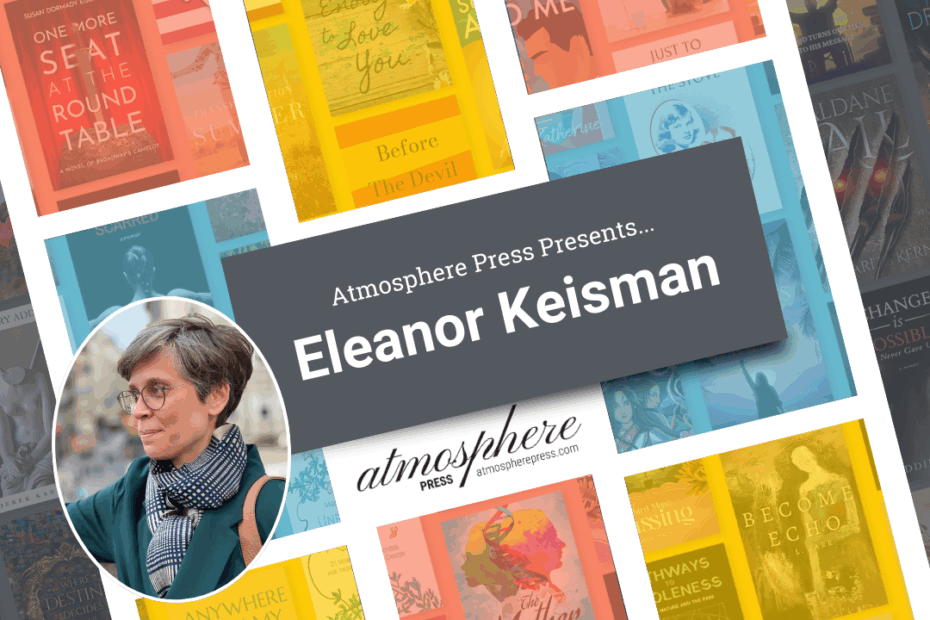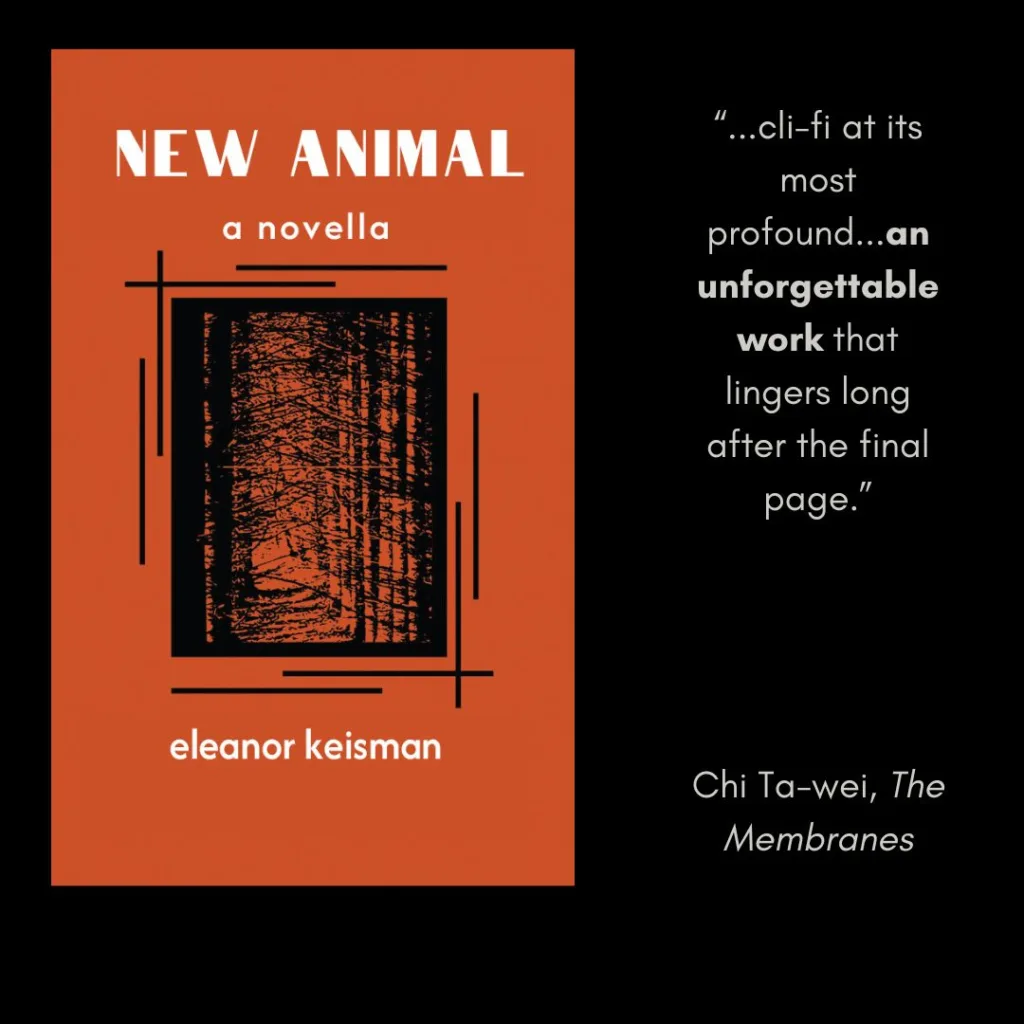An Interview with Eleanor Keisman

Eleanor Keisman’s short stories, essays, and poetry have appeared in Litro Magazine, The Bangalore Review, Tough Crime, Last Stanza Poetry Journal, and The Wild Umbrella, as well as adapted for “The Other Stories” podcast. After earning her BA in Liberal Arts from The New School, Eleanor left the US and spent over a decade living and working as an English teacher in Czechia, Poland, and China. She holds an MFA in creative writing from Drexel University and co-organizes an English-language writing group in Vienna, where she lives. New Animal is her first novel, and was shortlisted for Broken Tribe Press’ MFA Award. Click here to learn more!

Who/what made you want to write? Was there a particular person, or particular writers/works/art forms that influenced you?
I can’t recall a specific incident that made me want to write, or a specific person who inspired me, although there have been countless creative inspirations throughout my life. Writing started for me at a very young age. I’ve always been the type of person who felt compelled to find a way to express my personal experience of reality. Whether that was drawing, painting, writing letters to people, making up stories, poems, songs, inventing games with my friends, I was always making something. I think of all the forms, writing gives me a certain quality of access into my own mind, that the others do not. I still draw, I still explore other forms of creativity. I find that they offer me a certain mind state, and from that mind state, I’m a better writer. All forms influence each other, in a way.
What inspired you to start writing this book?
It sort of came about by accident. Before starting my MFA program, I had started plotting out a novel. I got maybe a third of the way through, but the story just wasn’t doing it for me. I’d recently written a short story called “Pope,” with just the wolf as the single character. And that story came about simply from a random thought I had one day, something along the lines of: Do domesticated dogs look like freaks of nature to wild wolves? (I love dogs, this thought was independent of that. I’m just the type of person who writes down all my random thoughts.)
That got me thinking about all the ways we make decisions about people based on appearance, how we decide that we are more like or less like another just because of how they look, or speak, or act, the fundamental things that differentiate people, like language and culture, and the ties that can never be broken, because they run too deep. I liked the short story, and I liked Pope.
Anyway, in my MFA program, I was sitting with this other third of a plotted novel, not liking it, trying to think of ways to fix it. It occurred to me: Why am I focusing on this when I don’t even like it? So I set it aside and began expanding “Pope” into something larger. I’ll admit that at first, it felt very forced. I did wonder at times if I was ruining the essence of the short story by attempting to expand it. And then, during the writing process, it became clear that the novella form was how this was going to take shape.
During all this uncertainty, my advisor was a huge resource to me. He kept cheering me on when I felt like the story was losing momentum, encouraging me to keep going. I really don’t know if the book would be here without him. Here’s to you, Ted.
Tell us the story of your book’s title. Was it easy to find, or did it take forever?
Normally I find titles really difficult to come up with. It’s gotten a little easier over time, with practice, but it definitely doesn’t come naturally to me. The title for my novel was an exception! It grew out of a short story, the title of which was the name of the main animal character, Pope. Of course, as the story grew, it took on a new focus, so the old title didn’t work anymore. I know it’s not a very exciting answer, but “New Animal” really just came to me as I was writing, and I was really pleased with it. I was looking for something that reflected the whole book on several levels, but also retained a kind of simplicity, and I think the title achieves that.
If your book had a soundtrack, what are some songs that would be on it?
New Animal doesn’t have a soundtrack, but music was definitely a very important tool for me while I was writing. One of the parts of the story that I got really stuck on, was the romance between the young Bill and Shirley. It was a fine line to walk, to write a romance that existed only in backstory, and only in someone’s memory, yet alive within them every day. I happened to stumble on an early Elton John song, “Come Down in Time,” and it hit me: This is them! Something about the song, the lyrics and the longing behind them, the cinematic flashback-like quality of the guitar, it helped me get into the headspace of a young romance, the way it can set up house in someone’s memory and stay for a lifetime. The memories stay, perhaps even sweeter than they were in the actual moment. That was the mood of the story of Bill and Shirley, and “Come Down in Time” encapsulated that perfectly.
What other professions have you worked in? What’s something about you that your readers wouldn’t know?
Professionally, I have never really found my thing. I got very into wine in my mid-20s and worked briefly in a wine shop in New York. I loved being around wine all day, learning about it, tasting it, reading about it, talking about it, but that whole world turned out to be shockingly sexist, and I was glad when my time there ultimately ended.
My longest job was working as an EFL teacher (English as a Foreign Language). I got certified to teach in Prague, taught there for a while, and then in Wrocław, Poland, and in China, a village called Yushan. In my experience, it was not a great job, in that you earned very little pay and the jobs had no stability whatsoever. But the actual teaching, that could be so much fun. I learned a lot about my own mother tongue, teaching it in a foreign setting, often while I was simultaneously learning the local language. The things that make English special, unique, funny, beautiful, and also nonsensical, are most richly experienced from an outside perspective. My students taught me a lot, in that regard. I haven’t taught English in many years, and there are things about it that I miss, and things that I definitely do NOT miss.
I’ve also done some marketing work for a startup, some secretarial work for an NGO. At the moment, I’m between jobs, and I’m not really sure what’s next, in terms of what will pay the bills. But writing, that’s always going on for me, and it’s probably the thing I’m best at.
What books did you read (for research or comfort) throughout your writing process?
I can’t talk about New Animal without talking about Jack London’s Call of the Wild. His character, Buck, was a huge influence for me as I was developing the character of Pope, and I re-read the book during the writing process. It’s such a perfect and timeless depiction of the bond between man and animal, as well as a respectful and believable approach to verbalising a non-verbal creature. There are very few books that can make me actually cry, and that’s one of them, and that was what I hoped I’d capture with New Animal.
I also read a lot of non-fiction during the writing process. As I was writing about wolves—and I knew nothing about them—I needed to do a lot of research. I read dozens of scientific websites about wolf behaviour and their environmental impact. I also read several book of first-hand accounts of reintroducing wolves to certain regions in North America, namely Yellowstone National Park. These books could very well read as fiction. I found that the people (scientists, zoologists, environmentalists) who write about wolves, truly write about them with love—and it’s contagious. One of the books that will continue to hold a very special meaning for me is The Wisdom of Wolves: Lessons from the Sawtooth Pack, by Jim and Jamie Dutcher. It’s an incredible account of the reintroduction and establishment of a wolf pack in the Sawtooth Mountains in Washington State, and it’s a stunning record of wolf behaviour and relationships.
I also tried to pick up any contemporary books I could find that had animal protagonists: The Evolution of Bruno Littlemore by Benjamin Hale, Firmin by Sam Savage, Open Throat by Henry Hoke, The Animals in that Country by Laura Jean McKay, Suspect by Robert Crais, to name a selection. I wanted to get as much information as I could about how to portray an animal character in a literary form. It became fascinating how many ways there are to achieve that, and it gave me confidence to find my own approach.
I’ll mention two contemporary climate fiction novels that were very influential to read during my writing process—as well as a great pleasure. Man v Wild by Diane Cook, and The Membranes by Ta-Wei Chi. Man v Wild is a collection of short stories set in the not-so-distant future, and captures how mankind copes with climate change, in a variety of heartbreaking settings. Cook manages to write these episodes with such empathy, and in doing so, makes the fantastical and horrifying stories very accessible. The Membranes is a fascinating novella from Taiwan, and while it addresses issues of gender and sexuality, one of the things I find so fascinating about Ta-Wei’s writing is how he builds an intimate and unusual sense of interiority of the protagonist. It was something I hoped to achieve as I stepped into the heads of my own characters. He also ends his book with one of the most devastating twists I’ve ever read. It haunted me afterward!
Finally, John Wyndham’s The Day of the Triffids, and a selection of his short stories from the collection Consider Her Ways. Wyndham was an English sci-fi writer in the 1960s and one of the elements in his work that’s so impactful for me, is how accessible he makes his characters. These are people living through climate change, coping with radically altered environments and human societies, and yet, they seem just like us. While they spend their days trying to survive, they also think about love, family, friendships, isolation and community. It’s all so relatable, and easy to forget that the worlds in the book are all that different from our own. And that’s what I wanted for New Animal. I wanted the characters to feel familiar to the reader, to have hopes and struggles that would be universal and independent of climate or time.
What advice would you give your past self at the start of your writing journey?
I don’t think I would give my past self any advice. Every moment, every choice, every step and misstep, it was all very needed. The uncertainty and self-doubt, the anxiety, the successes and failures, the agonizing rewrites, the hours spent staring at the horror of the blank page—if I could go back and save myself from it, or make it a little easier, well, I wouldn’t. That would be a disservice. And I hope if someone asks me that question in 10 or 20 years time, my answer will be the same. Anyway, all that stuff still happens to me, and probably always will. I don’t think I’ll ever feel “settled” as a writer. Every time I start something new, it’s as if I’ve never written anything before in my life. The only difference is, now I know that feeling is necessary, and it will lead somewhere.
What’s one thing you hope sticks with readers after they finish your book?
I wouldn’t want to tell a reader how they should perceive my writing. I think the experience of the reader is incredibly valuable, and how my work is going to reach them, to touch them, is unique to each individual, at that place in their life. I wouldn’t want to take that away.
So, I just hope they enjoy the book, and find a personal way to connect with it. One of my favorite things about books is that they become like old friends. I hope that in New Animal, readers find an understanding in the characters and in the story that they can hold on to like that. I hope that when they close the book, the place feels solid and real for them, somewhere they can return to whenever they wish.
Are you a writer, too? Submit your manuscript to Atmosphere Press.

Atmosphere Press is a selective hybrid publisher founded in 2015 on the principles of Honesty, Transparency, Professionalism, Kindness, and Making Your Book Awesome. Our books have won dozens of awards and sold tens of thousands of copies. If you’re interested in learning more, or seeking publication for your own work, please explore the links below.

